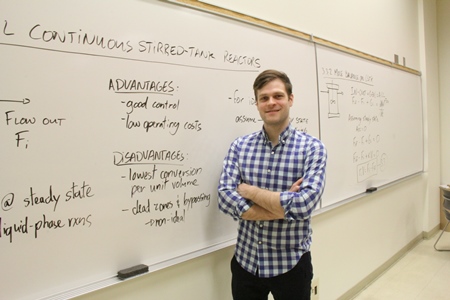
Chemical engineering professor Dominic Sauvageau won the UAlberta Provost's Award for Early Achievement of Excellence in Undergraduate Teaching. This is the second year in a row that the award has been won by an engineering professor and is the latest in a string of prestigious teaching awards for the faculty.
Edmonton-It was virtually raining awards at the University of Alberta faculty of Engineering today as professors and graduate students were honoured for their achievements in teaching and research.
Presented during an Engineering Faculty Council meeting, teaching awards were presented to four professors and 19 graduate student-and four professors were presented with newly established Faculty of Engineering Research awards.
In a separate university-wide awards presentation, chemical engineering professor Dominic Sauvageau won the University of Alberta Provost's Award for Early Achievement of Excellence in Undergraduate Teaching. This is the second year in a row that the award has been won by an engineering professor and is the latest in a string of prestigious teaching awards for the faculty. Over the past two years faculty teaching awards have included two APEGA awards for Excellence in Education, an Engineers Canada Medal for Distinction in Engineering Education, and two U of A Rutherford Teaching Award for Excellence in Undergraduate teaching (Department of Electrical and Computer Engineering professor Masoud Ardakani won this year's Rutherford Award.)
Sauvageau says that when he joined the Faculty of Engineering four years ago he joined a community of professors who are as dedicated to continuous improvement in teaching and learning as they are to conducting world-class research.
"The weight put on teaching here is very high," he said. "Teaching is important. It's one thing to say it but to see that it is acted upon and recognized is another. We have a community of people here who want to make teaching better and who want to improve the learning experience for our students. There are people here providing tools to help achieve that, whether it it's through workshops or just in casual settings like going for coffee."
The award recognizes many different levels of teaching, from lectures and labs to interdisciplinary teaching collaborations and work professors do with student groups. Sauvageau has made an impact in all areas of teaching.
In 2012, his work with an interdisciplinary group of engineering and science students helped the students make a scientific breakthrough, win an international competition and explore their entrepreneurial potential. The student team won the 2013 International Genetically Engineered Machine (iGEM) Competition. Under Sauvageau's supervision, working with a PhD student from the Faculty of Agricultural, Life and Environmental Sciences and the U of A's Biorefining Conversions Network, the team developed a method of turning waste paper that cannot be recycled into valuable chemicals that could be applied in a variety of products, including flu-busting medications.
Sauvageau also played a vital role in helping develop a web-based application that simulates a large-scale bioreactor. Bioreactors are used in wastewater treatment and environmental remediation. The vessels create optimal conditions to grow bacteria or enzymes and promote different types of fermentation. Commercially, they are used in in the production of pharmaceuticals, biofuels, and food flavouring.
Using the online version of the bioreactor, students are able to key in parameters and run virtual experiment quickly.
The application was designed with Department of Biological Sciences professor Julia Foght and PhD student Abigail Adebusuyi. The Stirred Tank University of Alberta Reactor Training (STUART) application enables students to simulate in minutes or hours experiments that would take two to three days to complete.
In the classroom, Sauvageau teaches courses in chemical reactor analysis and process analysis, and he has been involved as a technical contact for teams in senior design courses.
One of the courses he teaches is an important introductory chemical engineering class that provides students with the underpinnings of their chemical engineering education.
"The challenge is to make sure they get the basics right and are confident enough to build on them," he said, adding that there can be up to 120 students in the class each semester. "One thing I try to do is make the teaching and learning experience a conversation as opposed to me just being there, talking. You have to create an environment where people feel comfortable enough to engage in conversations, and make sure the information you're teaching is conveyed in a way that allows a big group to grasp concepts early on."
In a third-year course he teaches, Sauvageau's goal is to go beyond memorizing equations to understand how and why they were developed, to gain a thorough understanding and intuitive knowledge of their field. He likes connecting different courses to one another, helping students see that they are not taking separate classes but are, rather, involved in a larger interconnected area of study.
He describes his teaching methods as "old-style lecturing" in which he writes out ideas, concepts, and formulas on a white board. This gives his lectures a comfortable pace and allows him time to explain ideas in greater depth by engaging students in conversations about the subject.
"I'm giving people tools-not recipes," he said, adding that he's honoured to receive the award.
"It's nice recognition for the time and energy we put into teaching, but the real reward is seeing students using what they've learned and doing extraordinary things."
Four Faculty of Engineering professors were also recognized for their research endeavours today, receiving the inaugural Faculty of Engineering Research Awards. The honours went to Jason Carey (Mechanical Engineering) and Hai Jiang (Electrical and Computer Engineering).